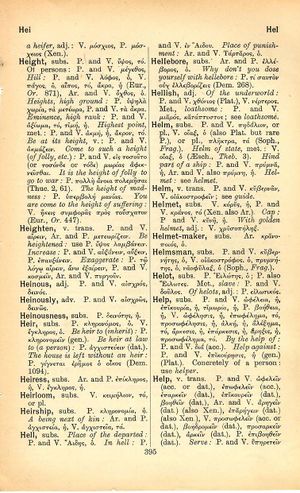heir: Difference between revisions
From LSJ
οὔ τι τὰ πολλὰ ἔπη φρονίμην ἀπεφήνατο δόξαν → a multitude of words is no proof of a prudent mind, many words do not declare an understanding heart
(CSV4) |
m (Woodhouse1 replacement) |
||
| Line 1: | Line 1: | ||
{{Woodhouse1 | {{Woodhouse1 | ||
|Text=[[File:woodhouse_395.jpg|thumb|link={{filepath:woodhouse_395.jpg}}]] | |Text=[[File:woodhouse_395.jpg|thumb|link={{filepath:woodhouse_395.jpg}}]] | ||
P. [[κληρονόμος]], ὁ. V. [[ἔγκληρος]], ὁ. | ===substantive=== | ||
[[prose|P.]] [[κληρονόμος]], ὁ. [[verse|V.]] [[ἔγκληρος]], ὁ. | |||
[[be heir to]] ([[inherit]]): [[prose|P.]] [[κληρονομεῖν]] (gen.). | |||
[[be heir at law to]] (a [[person]]): [[prose|P.]] [[ἀγχιστεύειν]] (dat.). | |||
[[the house is left without an heir]]: [[prose|P.]] [[γίγνεται ἐρῆμος]] [[ὁ οἶκος]] ([[Demosthenes|Dem.]] 1094). | |||
}} | }} | ||
Revision as of 08:55, 20 May 2020
English > Greek (Woodhouse)
substantive
P. κληρονόμος, ὁ. V. ἔγκληρος, ὁ.
be heir to (inherit): P. κληρονομεῖν (gen.).
be heir at law to (a person): P. ἀγχιστεύειν (dat.).
the house is left without an heir: P. γίγνεται ἐρῆμος ὁ οἶκος (Dem. 1094).

